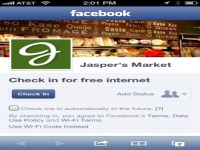Facebook and Cisco are jointly announcing Wednesday that they've partnered to bring the social Wi-Fi option to more businesses after a small but fruitful pilot of the system in around 1,000 small and medium-sized businesses. For the average restaurant diner, airport goer, or superstore shopper, the arrangement should mean they'll soon find Facebook Wi-Fi at more of the places they visit regularly.
For Facebook, the Wi-Fi-with-check-in initiative is part of a broader plan to attack the local market by encouraging merchants to set up and maintain Pages on the social network. Participating merchants will get additional distribution with each check-in, receiving exposure that could help bring in more customers or inspire more "likes." They'll also benefit from aggregate, anonymous demographic data such as age, gender, and interests on customers who sign-in to Facebook Wi-Fi, and can then use that data for targeting purposes in whatever Facebook advertising campaigns they run.
In essence, Facebook, which is not profiting directly from any revenue share through the partnership, hopes to attract more merchants that go on to buy ads. The idea is also to become a formidable player in local search, an area where everyone from Google and Yahoo to Yelp and Foursquare are competing for attention and advertising dollars.
"Today's announcement with Cisco really, in my mind, expands the scope of where we can deploy this product," Erick Tseng, who's heading up the project for the social network. "Through them, we now have access to many of the world's biggest brands and businesses."
The local-meets-social initiative is the biggest yet for Facebook, which has already gone out of its way to reformat business Pages into more Yelp-like entities on smartphones.
The three-step Facebook Wi-Fi system, which can be deployed by merchants running a Cisco router setup, lets people connect to a venue's Wi-Fi, launch their browser, and click on the blue check-in button to gain unfettered access to the Internet.
"In a nutshell, this is checking in on Facebook for free Wi-Fi," said Tseng.
In a field trial kicked off in October, Facebook noticed that its 25 participating merchants in the Bay Area saw a minimum of three times their average daily check-ins, he said.
Cisco, meanwhile, seeks to cater to its enterprise clientele looking to reach mobile consumers, a ballooning bunch who is showing an increasing appetite for shopping on smartphones while in stores and who is seeking information on sales, according to a Cisco-commissioned report. Cisco Vice President and Chief Technology Officer Bob says the networking giant also aims to help venues connect with customers outside their shops.
Whatever the reasoning behind Facebook Wi-Fi, there's no question that millions of people will find the prospect of free Wi-Fi too good to pass up, which raises a number of privacy issues. What does it mean when you link your Facebook account to your browsing history, especially when merchant and social network would seemingly benefit from knowing more about you?
Fear not, said Tseng. "The design of the product is specifically architected in a way such that as soon as the user checks in on Facebook, through Facebook Wi-Fi, Facebook then hands the user back to the router and completely steps out of the picture," he said. "All the browsing traffic that do you on Facebook Wi-Fi after the initial authentication and check-in is completely outside of Facebook's network. We, at Facebook, don't see any of that traffic. We are not involved in your browsing."
The reassurance will be good enough for some. For others, the Wi-Fi option is also available to people who aren't members of the social network or who don't want to check in. Browser landing pages will include a link that people can use to skip the check-in process and enter a code instead.

